Index’s summer magazine launch party marks 100th anniversary of Russian Revolution
[vc_row][vc_column][vc_column_text]
Index on Censorship magazine celebrated the launch of its summer 2017 issue with an evening exploring the 1917 Russian Revolution and its effects on our freedoms today.
The Calvert 22 Foundation-hosted event examined the role of propaganda, culture and politics from around the globe.
Speakers included Don Guttenplan, editor-at-large for The Nation, who spoke on the cultural Cold War; Katya Rogatchevskaia, lead curator of Central and East European collections at the British Library, who examined the role of Russian propaganda both during the Cold War and today; and Adam Cathcart, a specialist in Chinese history at Leeds University, who spoke on the impact of Soviet art and music in North Korea.
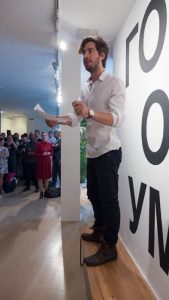 Guests were invited to listen to actors performing excerpts from speeches by Lenin, Stalin and Putin. Guttenplan noted the speeches reminded him of the dialogue he hears in today’s political realm. “When we were listening to Lenin’s speech, I was thinking, well that doesn’t sound that different from John McDonnell and Jeremy Corbyn,” he said.
Guests were invited to listen to actors performing excerpts from speeches by Lenin, Stalin and Putin. Guttenplan noted the speeches reminded him of the dialogue he hears in today’s political realm. “When we were listening to Lenin’s speech, I was thinking, well that doesn’t sound that different from John McDonnell and Jeremy Corbyn,” he said.
Rogatchevskaia discussed how art and propaganda influenced the Russian Revolution. “It was important that a revolution was happening at the same time in art and in social and political life,” she said. “These two revolutions actually met at one point and that created a fantastic abundance of really great art, and that’s why we remember this period.”
Cathcart spoke of the “cultural cold war” with South Korea on one side and China and North Korea on the other. He explained how cultural revolutions in South Korea have influenced the Chinese mindset and their favour of North Korean customs. “Chinese scholars have to come to grips with the Korean wave,” Cathcart said. “This is a country that has done extremely well, everybody’s on high broadband internet, the pop bands are doing extremely well. North Korea exports almost nothing culturally. North Korean music is something they’ve [the Chinese] tried to bring in competition with South Korea.”
Index’s summer publication, which was given to all attendees, features reports from across the globe including Uzbekistan, China, Russia, Cuba and Turkey. Writers for this issue include David Aaronovitch, Nikita Khrushchev’s great-granddaughter Nina Khrushcheva, and an interview with author Margaret Atwood.
The event was held on at Calvert 22 Foundation, which celebrates the culture and creativity of the New East.
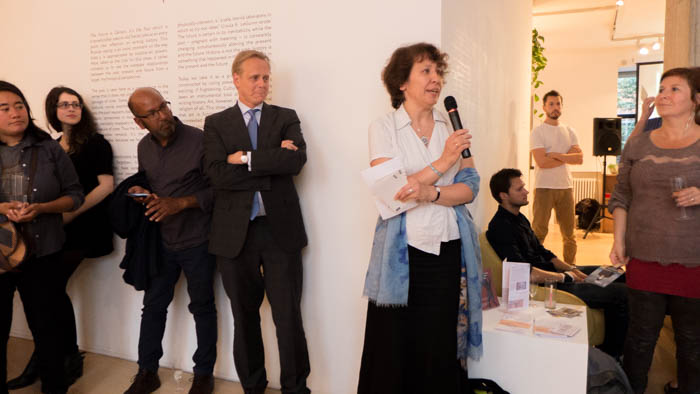
Katya Rogatchevskaia, lead Curator of Central and East European collections at the British Library, discusses Russia’s revolutionary propaganda. (Photo: Sean Gallagher / Index on Censorship)
An actor reads from a speech by Vladimir Lenin. (Photo: Sean Gallagher / Index on Censorship)
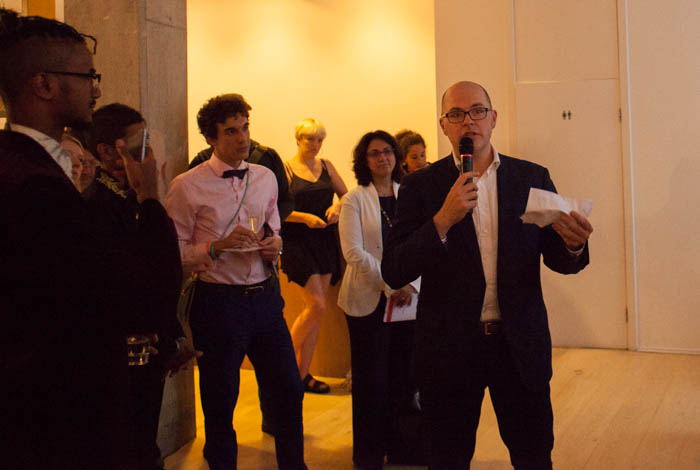
Adam Cathcart, a specialist and lecturer in Chinese history at Leeds University, explores the impact of Soviet art on North Korean art and culture. (Photo: Sean Gallagher / Index on Censorship)
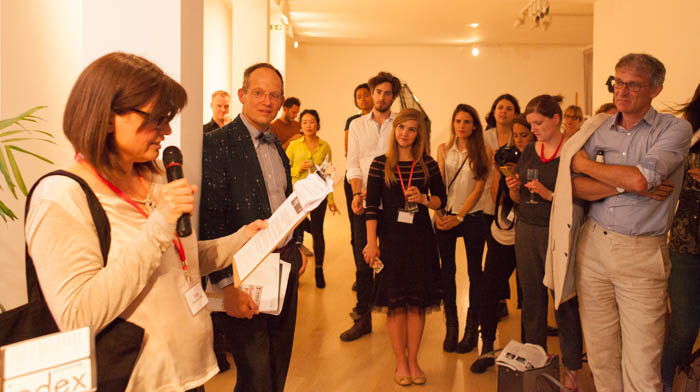
Index on Censorship magazine editor Rachael Jolley introduces the summer 2017 issue. (Photo: Sean Gallagher / Index on Censorship)
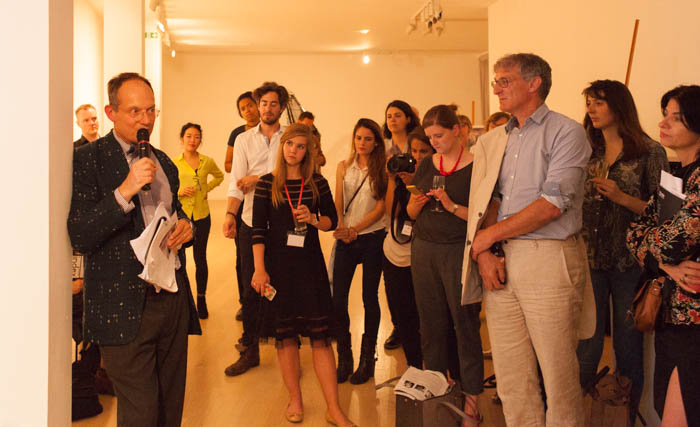
Don Guttenplan, Editor-at-Large for The Nation, shares his take on the cultural cold war, (Photo: Sean Gallagher / Index on Censorship)
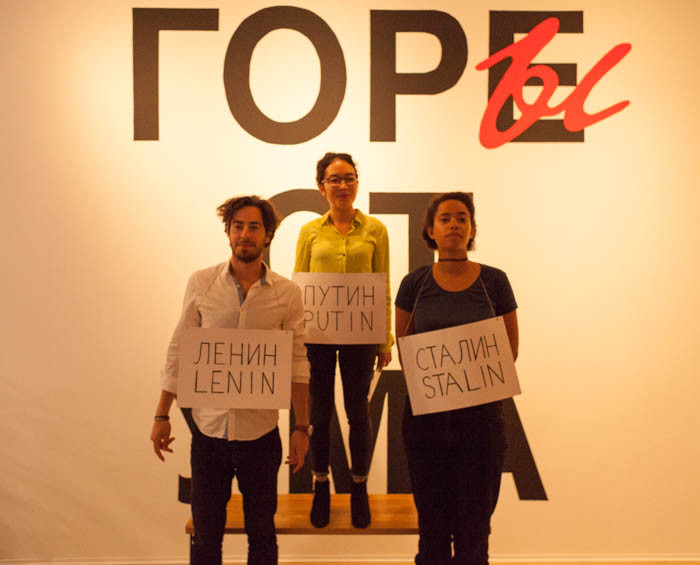
Actors read from speeches by Lenin (Matthew Romain), Stalin (Amanda Wilkin) and Putin (Jennifer Leong). (Photo: Sean Gallagher / Index on Censorship)
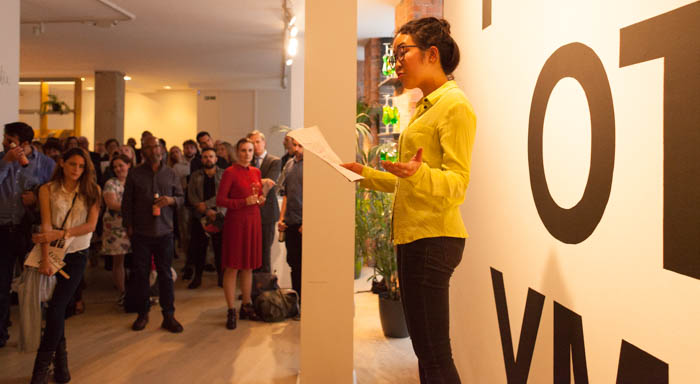
An actor reads from a speech by Vladimir Putin. (Photo: Sean Gallagher / Index on Censorship)
Propaganda or art? Both? @IndexCensorship @Index_Magazine #100YearsOn bolsheviks understood the ease of modern art for illiterate population pic.twitter.com/CAXbYeSIM8
— Bronia Flett-Humble (@BroniaSAGE) June 27, 2017
Another great issue of @Index_Magazine and launch at #100YearsOn – couldn’t quite applaud the actor playing Putin for obvious reasons but… pic.twitter.com/OrFekNmEtD
— Andrew Copson (@andrewcopson) June 27, 2017
[/vc_column_text][/vc_column][/vc_row][vc_row content_placement=”top”][vc_column width=”1/3″][vc_custom_heading text=”100 Years On” font_container=”tag:p|font_size:24|text_align:left” link=”url:https%3A%2F%2Fwww.indexoncensorship.org%2F2017%2F06%2F100-years-on%2F|||”][vc_column_text]Through a range of in-depth reporting, interviews and illustrations, the summer 2017 issue of Index on Censorship magazine explores how the consequences of the 1917 Russian Revolution still affect freedoms today, in Russia and around the world.
With: Andrei Arkhangelsky, BG Muhn, Nina Khrushcheva[/vc_column_text][/vc_column][vc_column width=”1/3″][vc_single_image image=”91220″ img_size=”medium” alignment=”center” onclick=”custom_link” link=”https://www.indexoncensorship.org/magazine”][/vc_column][vc_column width=”1/3″ css=”.vc_custom_1481888488328{padding-bottom: 50px !important;}”][vc_custom_heading text=”Subscribe” font_container=”tag:p|font_size:24|text_align:left” link=”url:https%3A%2F%2Fwww.indexoncensorship.org%2Fsubscribe%2F|||”][vc_column_text]In print, online. In your mailbox, on your iPad.
Subscription options from £18 or just £1.49 in the App Store for a digital issue.
Every subscriber helps support Index on Censorship’s projects around the world.
![]() SUBSCRIBE NOW[/vc_column_text][/vc_column][/vc_row]
SUBSCRIBE NOW[/vc_column_text][/vc_column][/vc_row]
